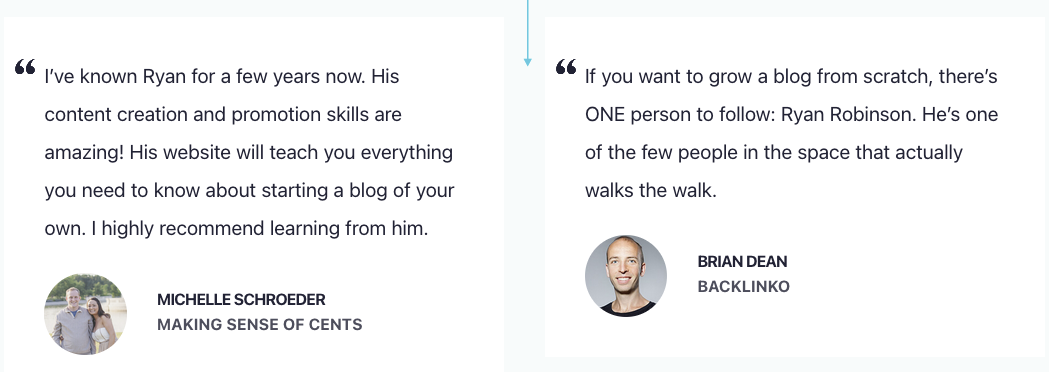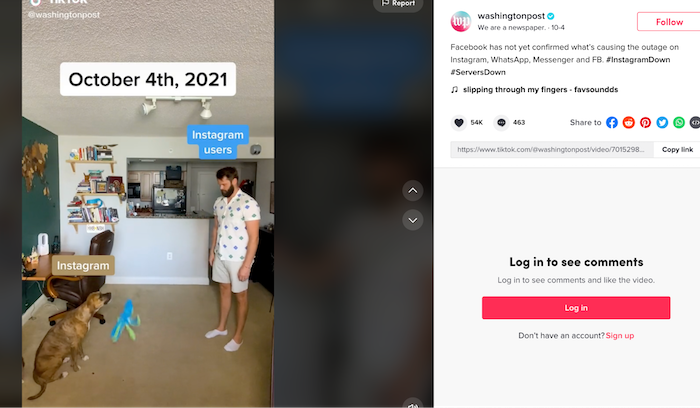

The competition for attention online is overwhelming. Many people, businesses, and politicians are clamoring for your attention.
“Check out my video!”
“See why my blog post is the best!”
“Click here for killer content!”
“Buy my product!”
Whether you’re starting a business and building an audience for your products and services or launching a personal blog, it can be frustrating and discouraging to try to break through the noise.
A single video can go viral, but a marketing campaign you’ve spent hours or weeks on can often receive little or no attention.
Over the last ten years, I’ve successfully developed my blog into a revenue-generating business that attracts over 500,000 visitors a month. I’ve built my blog into something I’m proud of, and I’ve coached and consulted many other bloggers to help them build successful revenue-generating businesses.
Below, I’ll share some of my favorite techniques I’ve used on my blog — the ones that made me feel like the hard work and time spent blogging was worth the effort.
Are you ready to grow your blog and start attracting the readership you’ve been hoping for? These six proven insights and strategies will help grow your website’s traffic, regardless of your niche.
1. Go where your competition won’t
It may sound like I’m directing you to go down a seedy path, but what I mean is, go the extra distance to do more than your competition.
Being a modern blogger means leaning into your strengths and finding clever, innovative ways to differentiate yourself from your competition.
Your content can be more helpful, entertaining, engaging, or unique than other bloggers in your niche. You can provide something new that’s relevant, informative, interesting, and different from other blogs.
Have you ever read an online article that covered a topic you were interested in, but every point was general and vague? It probably scratched the surface but didn’t provide you with new insights or help answer the questions you were trying to answer.
You might read something like “10 Ways to Save Money this Holiday Season”, but when you’re done reading it, you haven’t learned anything. It turned out to be a waste of your time.
Don’t waste your readers’ time — go one step further to give them honest information that answers their questions and doesn’t require them to go to another website to find out more.
One way I’ve done this is by writing a nearly 20,000-word guide about how to start a blog. When I wrote that guide, it was almost double the length of my competitor’s posts. I did something they weren’t willing to do.
I also chose not to stuff it with useless or repetitive information to boost my words. I tried to be as in-depth as possible, covering the granular details my competition didn’t bother to share with their readers.
Additionally, I spent several weeks putting together a 40-minute YouTube video that I embedded in the article. By doing this, I attracted a large audience that appreciated the more nuanced tutorial that provided more information and action steps than other people had written in that space.
How can you apply this to your blog?
Having a strong blog doesn’t only mean writing longer articles than your competition. You must make deliberate decisions and create a brand strategy that differentiates your blog from other blogs in your niche.
Fortunately, there are many ways that you can differentiate your blog:
- People may be attracted to your blog because of your hilarious or unusual writing style.
- You may have an engaged audience because you offer something completely novel in your niche — a new take on an old subject.
- Your blog may stand out because of its visual nature.
- Maybe you have incredible pictures, graphics, videos, or other visuals.
What is different or unique about your blog? What’s something that you can offer that your competition isn’t? What personal gifts can you use in your space that make you appealing in a new or different way?
Take a look at your current content and be honest with yourself.
Are you providing something that your audience would want to read? Are you writing something better than the competition?
If not, take some time to brainstorm changes you can make. Your goal shouldn’t just be to add to the noise on the internet but to make something worthy of your readers’ time.
2. Use storytelling to grow your audience
Storytelling is a proven way to engage an audience.
When you share parts of your life and who you are, it gives your visitors something to connect with. It’s the same reason people love to learn about an underdog who makes it to the major leagues or why they think it’s interesting to learn about huge companies that started in a garage.
Storytelling gives people a reason to care, which is essential because you can appeal to people with only facts and logic, but most people feel more inclined to follow something when there’s an emotional draw.
To this day, some of the most successful (and engaging) content I’ve written leans hard into storytelling. When I chronicle my journey in a way that’s relatable to my audience, and I show them I understand where they are because I’ve been there, it not only humanizes me as an author, but it also puts me on a level playing field with my audience. I know what it feels like to be where they are, and this gives them the ability to connect with me and my writing.
For example, in my how to start a blog guide, I wrote about making money from a blog. I start by pulling the curtain back on my journey as a blogger. I share screenshots of my Google Analytics reports, and I go to great lengths to share lessons I’ve learned from my own experience as a blogger. I provide helpful insights to people at various stages of their adventure while showing that I understand what it feels like to be on a similar path.
3. Offer exceptional bonus content
Another way to set yourself apart and get ahead of your competition is to offer freebies that go above and beyond anything other people provide. Giving away something of value will encourage your readers to share your content with others in their network.
On my blog, I have a blog business template that is one of the most successful pieces of bonus content I offer. It’s popular because it’s highly involved and helps new bloggers create an action plan they can understand and begin using right away. Over the years, it has attracted a lot of attention, which drives more traffic to my blog and other blog posts that generate a profit.
Potential freebies for your blog will look different, depending on your niche. Crowdspring, for example, shares numerous terrific guides, such as their popular guide to building a great brand identity:

FREE BRAND IDENTITY GUIDE
Unlock the secret to faster business growth. Get the free guide now.
We just emailed the Brand Identity Guide to you.
Here are some other examples:
- If you have a crafting blog, you might want to give away free plans to your readers.
- If you’re a food blogger, you could give away an eBook with some of your favorite recipes (that haven’t been shared elsewhere on your blog.)
- A blog geared toward children might share printable worksheets.
Whatever your free downloadable item is, the objective is to give people a reason to spend some time on your blog and pass it along to others.
4. Use social proof to gain your audience’s trust
In 1984, Robert Cialdini wrote a book entitled Influence, in which he discussed a psychological phenomenon he called “social proof” or “informational social influence.”
Humans often emulate others, especially in situations where they may not know how to act. If you’re invited to the White House or a celebrity event, you might look around at others who are more familiar with that scene and try to do what they’re doing.
This marketing psychology phenomenon has been used in marketing for some time, and it’s something that you can use as a blogger. It’s the definition of what an influencer is.
You trust an influencer because you believe they share things that make your life better in some way. You’re more willing to buy something from someone you trust who is an expert in their field — and someone who can guide you into unfamiliar territory.
I thoughtfully use social proof in my Built to Blog course landing page. By highlighting what other respected industry leaders have to say about my course, I gain some credibility for my work and show potential students that I’m a respected figure in the blogging space.
Here are a couple of snippets I added to my landing page that show influential people in my niche sharing their thoughts about my blog.

Another example of social proof could be highlighting social shares at the top of your articles (I no longer do that on my site for speed & performance optimizations, but it can still work very well) or by showcasing the number of comments on an article.
5. Be human with your audience
As I talked about with storytelling, readers and viewers like it when they know the person behind a blog or business. That’s why you’ll see businesses opening social media accounts or why you see companies with commercials that feature the owners in a personal way.
Video is a impactful way to humanize yourself for your audience, so I highly recommend pairing your written blog content with shorter-form videos that can add more context, depth, or even just a dose of entertainment to the subject at hand. My YouTube channel is an excellent example of how I’m putting this into practice today.
Keep in mind that when you use different marketing and social channels to promote and build your brand, you must be sure that the way you showcase the brand on those channels is consistent. Your brand identity is important, but it will be recognizable and memorable only if consistent.
Humor can be another way to connect with your audience.
Remember when Wendy’s started roasting their competition and leaving snarky comments on their social media threads? It was a little risky, but it was a move that panned out for them in the social media world.

The Washington Post uses a similar tactic with their TikTok account. On their TikTok, they talk about the news, but they also use TikTok trends and present the news in funny and absurd ways.

This content was so different from the traditional news style that many people wondered if it was a fake account pretending to be the Washington Post. However, it was a smart move to reach a new audience (a younger generation) and presented the Washington Post as more than just a stuffy old newspaper.
Your About Page is another easy way to share who you are with your visitors. If they become interested in your content, they may want to know more about the person behind the writing. Your About Page can work for social proof and share personal details about who you are, what you do, and why you do it.
6. Focus on community to grow your blog
Community is everything. If your goal is to build a business around your blog, you’ll have to keep a close read on your audience’s needs — which means staying in touch with them.
Learn where your audience spends their time online, whether in Facebook groups, on LinkedIn, Twitter, Instagram, Quora, or otherwise. Meeting them where they already feel comfortable is a significant first step towards building connections with them.
It’s only through honest conversations that you can grow in your understanding of their needs and eventually work on win-win ways to monetize your blog with them.
Use an email list to build your community
You probably think of social media when you think about building a community. Social media is absolutely a great way to find and invest in your audience, but email is another important way to do this.
Email doesn’t get as much press as social media, but it’s more effective in many ways. People worldwide are more likely to use email than any single social media platform. While there are over 2 billion people using Facebook, over 4 billion people reportedly used email in 2020. The number of email users is projected to rise in the coming years.
When you build an email list, you’re collecting a group of people who have shown an interest in what you do, and unlike social media, 100% of email subscribers will have a chance to see your content. Most (if not all) social media platforms significantly restrict the number of your followers that see your posts. You may have 1,000 followers on Instagram, with only 100 seeing your posts.
To attract people to your email list, put an email catcher prominently on your blog. I placed an email signup spot at the end of each post, at the top of my main page, and the top of my About Me page. You can also use a popup that shows up when people come to your website. A popup can be slightly annoying, but it can also be effective.
To sweeten the deal, offer a freebie in exchange for an email subscription. A lead magnet can include templates, eBooks, plans, calendars, printables, and more.
How will you grow your blog?
Now that you’ve read through my best practices for growing a blog, which ones stood out to you? Which ones can you imagine putting into practice in the next few weeks, months, or years?
The most critical element in this equation is creating great content that resonates with your audience. The way you go about it — whether you use storytelling, humor, incredible graphics, videos, or whatever — is up to you and the talents and experience that you possess.
Try to give your audience something worth spending their time with, and don’t be afraid to go a little (or a lot) further than your competition while you do it.
